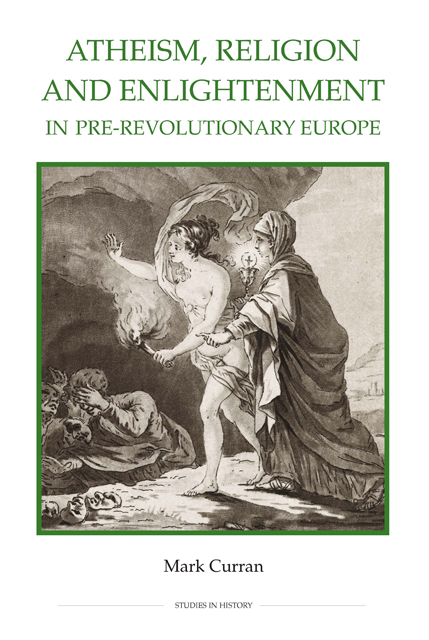Book contents
- Frontmatter
- Contents
- List of figures
- Acknowledgements
- Abbreviations
- Prologue
- Introduction
- 1 The virtuous atheist
- 2 The oral and written public sphere
- 3 Books and pamphlets
- 4 Periodicals
- 5 The philosophe response
- 6 Institutional reactions in France
- 7 The Christian Enlightenment?
- 8 Beyond the Christian Enlightenment
- Appendices
- Bibliography
- Index
- Frontmatter
- Contents
- List of figures
- Acknowledgements
- Abbreviations
- Prologue
- Introduction
- 1 The virtuous atheist
- 2 The oral and written public sphere
- 3 Books and pamphlets
- 4 Periodicals
- 5 The philosophe response
- 6 Institutional reactions in France
- 7 The Christian Enlightenment?
- 8 Beyond the Christian Enlightenment
- Appendices
- Bibliography
- Index
Summary
Of all the letters received by the editor of the Journal de Paris, few were quite as peculiar as one that landed upon his desk in 1786. The letter claimed to bear important news. The previous day its author had visited the house of a friend, ‘un curieux’, in whose garden he had witnessed a machine representing all the natural celestial movements. This machine, he reported, was so well constructed that, if viewed with the aid of a microscope, one could focus in upon the earth and make out its atmosphere and vegetation. It was so detailed, in fact, that upon closer inspection the little horns of an ox about to eat some grass had been visible. The ‘curieux’ himself, over the course of some time, had borne witness to a still more remarkable display. He had discovered the machine in embryonic form, when it resembled only a rough sketch of its current state, with the beginnings of the globes emerging from chaos. Each day he had returned and inspected it, following the scene as it developed towards maturity. He had seen the rains fall and the flowers grow. He had, in miniature, in his own garden, witnessed the creation of the world.
But not the heavens. Nor had he seen cogs, motors nor signs of craftsmanship, all of which pointed towards deeper mysteries. From where had this machine come, and how had it been set in motion? For the author of the letter, the machine was clearly imbued with too much genius to have been the work of man, and since nothing exists by chance alone, its origins could only have been divine. The ‘curieux’, by contrast, considered the machine to have had no creator, being the product of blind nature. To clarify his position, he quoted the Système de la nature, explaining that everything in nature is simply the result of different combinations of matter in motion. The author of the letter responded with the following logic: if the whole of nature is the same as its parts, and the whole is made up of its parts, then it must follow that the whole is made up of the whole. This, he suggested, was patently ridiculous.
- Type
- Chapter
- Information
- Publisher: Boydell & BrewerPrint publication year: 2012



